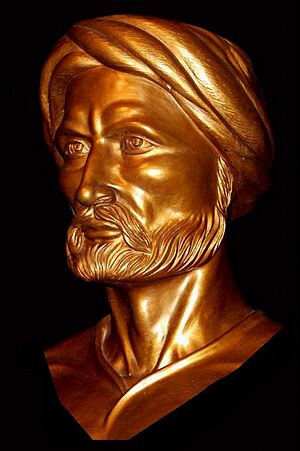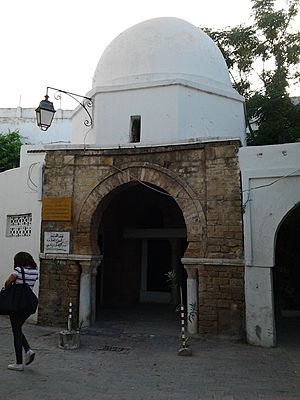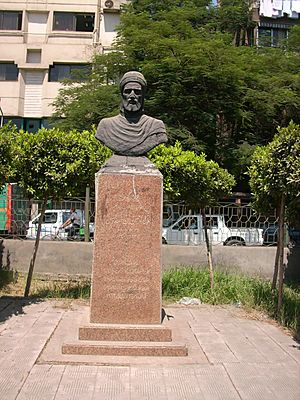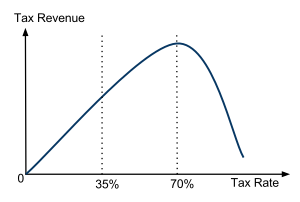Ibn Khaldun facts for kids
Quick facts for kids Ibn Khaldun |
|
|---|---|
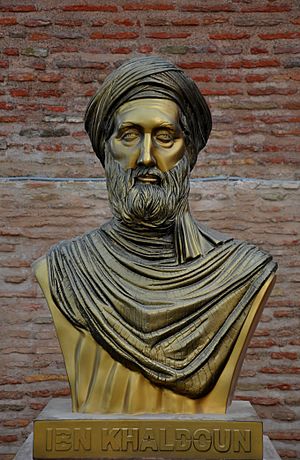
Bust of Ibn Khaldun in the entrance of the Kasbah of Bejaia, Algeria
|
|
| Religion | Islam |
| Denomination | Sunni |
| Personal | |
| Born | 27 May 1332 Tunis, Hafsid Sultanate |
| Died | 17 March 1406 (aged 73) Cairo, Mamluk Sultanate |
| Influenced |
|
Ibn Khaldun (born May 27, 1332 – died March 17, 1406) was a very important thinker from the Middle Ages. He is often called the "father" of many modern studies. These include historiography (the study of how history is written), sociology (the study of human societies), economics (the study of money and trade), and demography (the study of populations).
His most famous book is called the Muqaddimah, which means "The Introduction." He wrote it in just six months. This book had a big impact on historians in the 17th and 19th centuries, especially in the Ottoman Empire. They used his ideas to understand why empires grow and then decline. Ibn Khaldun even met Tamerlane, a powerful conqueror.
Many of Ibn Khaldun's ideas are similar to those of later European thinkers. These include philosophers like Niccolò Machiavelli and Karl Marx, and economists like Adam Smith. This shows how advanced his thinking was for his time.
Contents
About Ibn Khaldun's Family
We know a lot about Ibn Khaldun's life because he wrote his own autobiography. It was called "Presenting Ibn Khaldun and his Journey West and East." In this book, he included many documents about his life word-for-word.
Ibn Khaldun was born in Tunis in 1332. His family was from a high social class in Al-Andalus (modern-day Spain). They were of Arab descent and had moved to Tunisia after the city of Seville fell in 1248. Many of his family members had important political jobs. However, his father and grandfather later chose a more spiritual path. His brother, Yahya Khaldun, was also a historian. Sadly, he was killed by a rival.
Ibn Khaldun proudly traced his family back to an Arab tribe from the south of the Arabian Peninsula. This tribe came to Spain in the 8th century during the early Islamic conquests.
His Education
Ibn Khaldun's family background allowed him to learn from the best teachers in the Maghreb (North Africa). He received a traditional Islamic education. He studied the Quran and memorized it. He also learned Arabic, hadith (sayings of Prophet Muhammad), and sharia (Islamic law). He earned special certificates for all these subjects.
A mathematician and philosopher named Al-Abili taught him math, logic, and philosophy. He especially studied the works of great thinkers like Averroes and Avicenna. When he was 17, both his parents died from the Black Death. This was a terrible plague that spread across continents.
Following his family's tradition, Ibn Khaldun wanted a career in politics. North Africa at that time was politically unstable. This meant he had to be very smart about making and breaking alliances. His autobiography shows his adventurous life. He spent time in prison, reached high positions, and then fell from power.
His Political Career
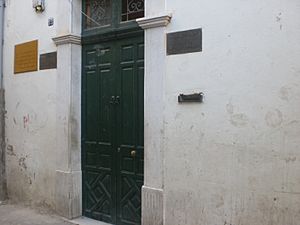
At age 20, Ibn Khaldun started his political journey. He worked for the Tunisian ruler Ibn Tafrakin. His job was to write the fancy opening lines of official documents. In 1352, he moved to Fez. There, the Marinid sultan gave him a job writing royal announcements. However, Ibn Khaldun was involved in plots against the ruler. This led to him being imprisoned for 22 months in 1357.
After the sultan died, he was freed and given back his job. He then plotted with the sultan's uncle, Abū Salem. When Abū Salem became ruler, he gave Ibn Khaldun a high-level ministerial position. This was the first job that truly matched Ibn Khaldun's ambitions.
Later, Ibn Khaldun moved to Granada in Spain. He was welcomed there because he had helped the Sultan of Granada, Muhammad V, regain his power. In 1364, Muhammad sent him on an important diplomatic mission. He had to negotiate a peace treaty with Pedro the Cruel, the king of Castile. Ibn Khaldun did this successfully. He even politely turned down Pedro's offer to stay at his court.
In Granada, Ibn Khaldun soon faced problems with Muhammad's vizier (chief minister), Ibn al-Khatib. Al-Khatib worried about Ibn Khaldun's close relationship with the sultan. He thought Ibn Khaldun's ideas for the young ruler were risky. Eventually, Ibn Khaldun was sent back to North Africa.
Back in Ifriqiya, the Hafsid sultan of Bougie made Ibn Khaldun his prime minister. Ibn Khaldun took on a difficult task. He collected taxes from the local Berber tribes. After this sultan died, Ibn Khaldun changed sides again. He allied with the Sultan of Tlemcen. He was later captured by a new ruler but then returned to his studies.
Ibn Khaldun's political skills and his good connections with the Berber tribes were always in demand. But he grew tired of politics and constantly changing loyalties. In 1375, he sought refuge with a Berber tribe in Qalat Ibn Salama, Algeria. He lived there for over three years. During this time, he wrote his famous book, the Muqaddimah. This book was an introduction to his planned history of the world.
To finish his work, he needed more books and resources. So, in 1378, he returned to his home city of Tunis. The new ruler, Abū l-Abbas, took him back into his service. Ibn Khaldun focused almost entirely on his studies and finished his world history. However, his relationship with the ruler remained difficult. Ibn Khaldun eventually left Tunis by pretending to go on the Hajj (pilgrimage) to Mecca. He sailed to Alexandria, Egypt.
Later Life and Travels
Ibn Khaldun admired Egypt, saying, "He who has not seen it does not know the power of Islam." While other Islamic regions faced wars, Mamluk Egypt was peaceful and culturally rich. In 1384, the Egyptian Sultan, Barquq, made Ibn Khaldun a professor. He also appointed him as the Grand qadi (judge) of the Maliki school of law. His attempts to make changes were met with resistance, and he resigned within a year. Sadly, in 1384, a ship carrying his wife and children sank off Alexandria.
After returning from his Hajj to Mecca in 1388, Ibn Khaldun focused on teaching in Cairo. He was appointed Maliki qadi several more times. He held this important position six times in total, though never for very long.
In 1401, Ibn Khaldun joined a military campaign against the Mongol conqueror, Timur. Timur was attacking Damascus. Ibn Khaldun doubted the mission would succeed. His doubts were proven right when the young sultan left his army and rushed back to Egypt. Ibn Khaldun stayed in the besieged city for seven weeks. He was lowered over the city wall by ropes to negotiate with Timur. He wrote a detailed account of these historic meetings in his autobiography. Timur asked him many questions about North Africa. Ibn Khaldun even wrote a long report about it for him.
Ibn Khaldun spent his last five years in Cairo. He finished his autobiography and his history of the world. He continued to teach and serve as a judge. He died on March 17, 1406.
His Important Works and Ideas
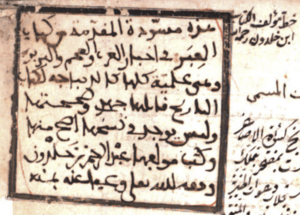
One of Ibn Khaldun's most famous ideas is about how civilizations rise and fall. He observed that when a society becomes very advanced, it often enters a period of decline. Then, a new group, often less developed, conquers it. These "barbarians" then adopt the culture and arts of the conquered society. Eventually, they too will be conquered by a new group, and the cycle repeats.
He believed that poverty was linked to the loss of good values. He also studied what makes a society wealthy, like how people spend money, how the government works, and investments. Ibn Khaldun argued that poverty isn't always from bad money choices. Sometimes, it's due to outside problems. He thought the government should help reduce poverty.
Ibn Khaldun's ideas about the division of labor are often compared to those of Adam Smith. Both believed that when people specialize in different tasks, it helps the economy grow. However, Ibn Khaldun thought that social unity (what he called asabiyyah) was the main reason for this division. Smith, on the other hand, focused on self-interest and the market.
Social Ideas
Ibn Khaldun believed that a government is necessary for human society. It helps stop injustice. But he also saw that the government uses force, which can itself be a form of injustice. He thought that societies always need a government to function.
He tried to find patterns in history that are true for all societies. For him, civilization is a natural part of human existence. It starts when people meet their basic needs. Then, they look for ways to produce more and expand. Later, societies become more settled and focus on crafts, arts, and culture. Eventually, a society weakens, and a new group takes control. This new group might be from within the society or from outside.
Ibn Khaldun also thought that too much government control, like high taxes, could harm a society. He believed it would stop people from developing specialized skills and services.
Another key idea was the importance of mastering crafts, habits, and skills. He said that a society's achievements could be seen by looking at these three things. Early societies were nomadic and focused on survival. Later, settled societies achieved more in crafts and technology. He also stressed that a strong education system is vital. Without it, new generations would struggle to keep or improve on past achievements. For him, language was also very important. He saw it as the most important part of a society, even more than the land itself.
His Other Writings
Besides his main works, Ibn Khaldun wrote several other books. His first book, Lubābu l-Muhassal, was a commentary on Islamic theology. He wrote it at age 19. He also wrote a book on Sufism (Islamic mysticism) called Shifā'u l-Sā'il around 1373. While at the court of Sultan Muhammad V, he wrote a book on logic.
His Lasting Impact
Ibn Khaldun's way of studying history was very new for his time. Not many people followed his methods right away. While he was a successful teacher of Islamic law, few of his students truly understood his Muqaddimah.
Some of his own time criticized him. They said he didn't know enough history or that his book was disorganized. However, later thinkers recognized his genius.
Impact in Egypt
One of his students, Al-Maqrizi, praised the Muqaddimah. But some scholars think this praise didn't fully grasp Ibn Khaldun's deep ideas. Ibn Khaldun also faced criticism because he challenged some old traditions.
Impact in the Ottoman Empire
Ibn Khaldun's work became more known in the Ottoman Empire in the 17th century. Historians like Kâtip Çelebi and Mustafa Naima were influenced by him. Naima even tried to use Ibn Khaldun's ideas about empires rising and falling to understand the Ottoman Empire.
Impact in Europe
Europeans first learned about Ibn Khaldun in 1697. A biography of him appeared in a book called Bibliothèque Orientale. His work started getting more attention in 1806. Parts of his Muqaddimah were translated into French. Over the years, more translations and details emerged. The complete Arabic version was published in 1858. Since then, his work has been studied widely in the Western world.
British historian Arnold J. Toynbee called Ibn Khaldun's Muqaddimah "the greatest work of its kind." Ernest Gellner, a philosophy professor, thought Ibn Khaldun's definition of government was the best ever.
Economist Paul Krugman called Ibn Khaldun "a 14th-century Islamic philosopher who basically invented what we would now call the social sciences." A 19th-century Scottish philosopher, Robert Flint, praised him highly. He said Ibn Khaldun had no equal as a history theorist until Giambattista Vico appeared over 300 years later.
Public Recognition Today
Ibn Khaldun has gained more public recognition recently. In 2004, the Tunisian Community Center created the first Ibn Khaldun Award. It honors Tunisians or Americans who show ideas similar to Ibn Khaldun's. In 2006, an essay contest for students was named after him. It focuses on how people can help free markets grow based on Islamic teachings.
In 2007, İbn Haldun Üniversitesi opened in Istanbul, Turkey. This university is named after him and focuses on social sciences.
In 1981, U.S. President Ronald Reagan mentioned Ibn Khaldun. He said Ibn Khaldun's ideas influenced his economic policies. Reagan paraphrased Ibn Khaldun, saying that "in the beginning of the dynasty, great tax revenues were gained from small assessments," and "at the end of the dynasty, small tax revenues were gained from large assessments."
The Iraqi Navy even named a frigate (a type of warship) after Ibn Khaldun.
Images for kids
-
Bust of Ibn Khaldun in the entrance of the Kasbah of Bejaia, Algeria
-
The birth home of Ibn Khaldun in Tunis.
-
Ibn Khaldūn's handwriting, certifying a copy of his book al-Muqaddima.
See also
 In Spanish: Ibn Jaldún para niños
In Spanish: Ibn Jaldún para niños
- List of pre-modern Arab scientists and scholars
- Asabiyyah
- Chanakya
- Egon Orowan
- List of Muslim historians
- Historiography of early Islam
- Laffer curve
- Muqaddimah
- Science in medieval Islam
- Social cycle theory
- Averroes
- Abulcasis
- Ibn Arabi
- Ibn Tufail
- Sayyid Husayn Ahlati
 | Delilah Pierce |
 | Gordon Parks |
 | Augusta Savage |
 | Charles Ethan Porter |


